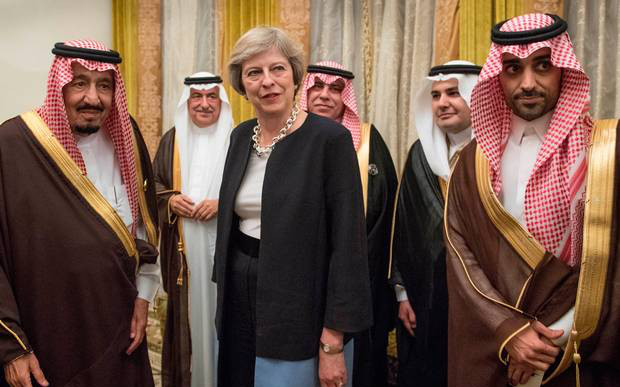On 13 December 2016, the United States blocked some arms sales to Saudi Arabia over concerns of civilian casualties in the kingdom’s participation in the conflict in Yemen. The United Kingdom (UK) has refused to follow the United States’ lead, with Prime Minister Theresa May rejecting calls to end some weapons sales. Her rejection comes several days after she and Foreign Secretary Boris Johnson returned from the region, where they met with leaders from the Gulf Cooperation Council (GCC) countries and discussed security cooperation and trade. They reportedly did not talk about human rights during their visits or acknowledge the role the UK is playing in aiding and abetting Saudi Arabia’s human rights abuses in the conflict in Yemen.
On 6 December, Theresa May arrived in Bahrain for the two-day annual GCC summit. She devoted her speech to the GCC to issues of security and trade and pledged to spend more than £3 billion on defense projects in the Gulf. During her visit, she also lauded the Saudi royal family for its “visionary leadership.” However, conspicuous in its absence, was acknowledgment of Saudi Arabia’s systematic human rights abuses domestically and abroad in Yemen.
As May left Bahrain on 7 December, Boris Johnson arrived in the region, where he participated in the Manama Dialogue and visited Riyadh. Before he arrived in Riyadh, Johnson made several comments criticizing Saudi Arabia’s illegal bombing campaign in Yemen. However, in the joint press conference with Adel al-Jubeir, Saudi Arabia’s Foreign Minister, he stressed the UK’s close ties with the kingdom and “emphasize[d] the friendship that exists between the UK and Saudi Arabia.”
Johnson’s decision to stress UK-Saudi friendship and gloss over human rights during his visit demonstrates the UK’s commitment to supporting a government that suppresses dissidents, discriminates against minorities, bans freedom of expression, association, and religion, tortures prisoners, and holds public executions. Over the last two years, the UK has demonstrated its commitment to Saudi Arabia by supporting it diplomatically and materially in the conflict in Yemen. This continued support comes despite numerous, credible allegations of Saudi Arabia’s human rights abuses in Yemen, in which the British government is increasingly complicit.
In September 2015, the UK leveraged its diplomatic influence to assist Saudi Arabia’s election to the United Nations Human Rights Council, despite concerns over the kingdom’s human rights record. In September 2016, the UK withheld its support for a proposal that would have established an independent international inquiry into Saudi Arabia’s violations in Yemen. The inquiry would have examined Saudi Arabia’s role in the death of thousands of civilians due to the kingdom’s airstrikes, as well as a blockade that has caused a severe humanitarian crisis, in which 80 percent of the population needs humanitarian assistance.
In addition to diplomatically supporting Saudi Arabia, the UK has given material assistance to the kingdom. Since Saudi Arabia intervened in the conflict in Yemen in March 2015, the UK has licensed over £3.3 billion worth of weapons. Saudi Arabia has used these munitions in airstrikes that struck refugee camps, hospitals, schools, weddings, and a funeral hall. These airstrikes have killed thousands of civilians, devastated the country’s infrastructure, and forced Médicines Sans Frontières to evacuate its personnel from northern Yemen. Two parliamentary committees, the Foreign Affairs Committee and the Business, Innovation and Skills and International Development Committee have recommended that the UK suspend arms sales to Saudi Arabia due to the risk that the UK has aided in Saudi Arabia’s violation of international humanitarian law with its killing of civilians. However, May has dismissed these concerns citing only the UK’s “very strict” vetting process.
The UK is aiding and abetting Saudi Arabia’s human rights abuses in Yemen, yet neither May nor Johnson discussed these during their visits to the region. Their refusal to do so demonstrates the UK’s blind commitment to Saudi Arabia. May and Johnson cannot absolve themselves of their role and responsibility in the Saudi kingdom’s bombing campaign or in Yemen’s humanitarian crisis. However, they can end their involvement in the Saudi government’s war by immediately blocking all arms sales to Saudi Arabia and proposing a Human Rights Council resolution calling for the establishment of an independent international investigation into Saudi Arabia’s involvement in Yemen.
Tyler Pry is the Sheikh Nimr al-Nimr Advocacy Fellow at ADHRB





